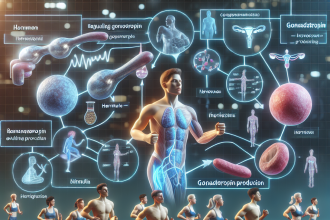-
Table of Contents
“`html
Use of testosterone as a supplement in sports: pharmacological approach
In the realm of sports pharmacology, testosterone has emerged as a pivotal substance, often discussed for its potential to enhance athletic performance. As a naturally occurring steroid hormone, testosterone plays a crucial role in the development of male reproductive tissues and the promotion of secondary sexual characteristics. Its anabolic effects, which include increased muscle mass and strength, have made it a substance of interest in the sports community. This article delves into the pharmacological aspects of testosterone supplementation in sports, examining its benefits, risks, and the ethical considerations surrounding its use.
Pharmacokinetics and pharmacodynamics of testosterone
Understanding the pharmacokinetics and pharmacodynamics of testosterone is essential for comprehending its effects on the human body. Pharmacokinetics refers to the absorption, distribution, metabolism, and excretion of testosterone, while pharmacodynamics involves the biochemical and physiological effects of the hormone.
Testosterone is primarily administered via intramuscular injections, transdermal patches, or gels. Once administered, it is absorbed into the bloodstream and distributed to various tissues. The liver metabolizes testosterone into dihydrotestosterone (DHT) and estradiol, which are then excreted through urine (Basaria et al. 2013). The half-life of testosterone varies depending on the mode of administration, with injectable forms having a longer half-life compared to transdermal applications.
Pharmacodynamically, testosterone binds to androgen receptors in muscle cells, promoting protein synthesis and muscle growth. This anabolic effect is the primary reason athletes seek testosterone supplementation. Additionally, testosterone influences erythropoiesis, increasing red blood cell production and enhancing oxygen delivery to muscles, thereby improving endurance (Bhasin et al. 2001).
Benefits of testosterone supplementation in sports
The use of testosterone as a supplement in sports is primarily driven by its potential to enhance physical performance. Athletes may experience several benefits, including:
- Increased muscle mass and strength: Testosterone promotes muscle hypertrophy, leading to greater strength and power output, which is advantageous in sports requiring explosive movements.
- Improved recovery: Testosterone aids in the repair of muscle tissues post-exercise, reducing recovery time and allowing athletes to train more frequently.
- Enhanced endurance: By stimulating erythropoiesis, testosterone increases the oxygen-carrying capacity of the blood, improving aerobic performance.
These benefits have been documented in various studies, with athletes reporting significant improvements in performance metrics following testosterone supplementation (Snyder et al. 2000).
Risks and ethical considerations
Despite its benefits, testosterone supplementation is not without risks. The potential adverse effects include:
- Cardiovascular issues: Testosterone can increase the risk of heart disease by elevating blood pressure and altering lipid profiles (Vigen et al. 2013).
- Hormonal imbalances: Exogenous testosterone can suppress natural hormone production, leading to testicular atrophy and infertility.
- Psychological effects: Mood swings, aggression, and other psychological disturbances have been associated with testosterone use.
From an ethical standpoint, the use of testosterone in sports raises questions about fairness and integrity. The World Anti-Doping Agency (WADA) prohibits testosterone use in competitive sports, considering it a form of doping. Athletes caught using testosterone face suspensions and damage to their reputations.
Real-world examples
Several high-profile cases have highlighted the use of testosterone in sports. For instance, cyclist Lance Armstrong was stripped of his Tour de France titles after admitting to using testosterone and other performance-enhancing drugs. Similarly, baseball player Alex Rodriguez faced suspension for his involvement in a doping scandal involving testosterone.
These cases underscore the ongoing challenge of regulating testosterone use in sports and the need for stringent testing protocols to ensure a level playing field.
Expert opinion
As an experienced researcher in sports pharmacology, I believe that while testosterone offers undeniable benefits for athletic performance, its use must be carefully regulated to prevent abuse and ensure athlete safety. The development of alternative strategies, such as optimizing training regimens and nutrition, can provide athletes with performance enhancements without the risks associated with testosterone supplementation.
Moreover, continued research into the long-term effects of testosterone use is essential to fully understand its impact on athlete health. By fostering a culture of transparency and ethical responsibility, the sports community can navigate the complexities of testosterone supplementation and uphold the integrity of competitive sports.
References
Basaria, S., Coviello, A. D., Travison, T. G., Storer, T. W., Farwell, W. R., Jette, A. M., … & Bhasin, S. (2013). Adverse events associated with testosterone administration. The New England Journal of Medicine, 369(2), 101-110.
Bhasin, S., Woodhouse, L., Casaburi, R., Singh, A. B., Bhasin, D., Berman, N., … & Sinha-Hikim, I. (2001). Testosterone dose-response relationships in healthy young men. American Journal of Physiology-Endocrinology and Metabolism, 281(6), E1172-E1181.
Snyder, P. J., Peachey, H., Hannoush, P., Berlin, J. A., Loh, L., Lenrow, D. A., … & Santanna, J. (2000). Effect of testosterone treatment on body composition and muscle strength in men over 65 years of age. The Journal of Clinical Endocrinology & Metabolism, 85(8), 2670-2677.
Vigen, R., O’Donnell, C. I., Barón, A. E., Grunwald, G. K., Maddox, T. M., Bradley, S. M., … & Ho, P. M. (2013). Association of testosterone therapy with mortality, myocardial infarction, and stroke in men with low testosterone levels. JAMA</em




